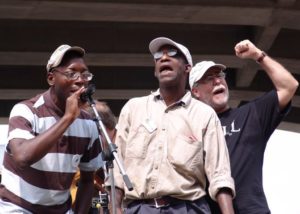WACO—Try to talk with Gaynor Yancey about needs and deficits, and before long, she will steer the conversation toward a discussion of assets and opportunities.
Ask her to conduct a community assessment, and where others see overgrown vacant lots, she sees available space churches can use to plant community gardens or develop neighborhood parks.
So, when confronted with a state where one child in four lives in a household that struggles to avoid hunger, rather than become overwhelmed by the need, Yancey grows energized by the possibilities.
“Historically, the church has always cared about hunger,” said Yancey, professor in the Diana R. Garland School of Social Work at Baylor University and director of the Center for Family and Community Ministries.
Most Christians recognize they have a responsibility to feed the hungry, she noted. The challenge rests in helping congregations move from doing ministry for the poor to ministering alongside the poor, she added.
Break bread with the poor
Churches provide a valuable service when they give bread to the hungry, Yancey said. But Christians offer a greater service when they break bread with the poor, she believes.
“If we don’t build relationships, we are feeding bodies, but we are not going deeper,” she said. “We are not doing what we uniquely are called to do.”
She favors what social relief providers call an “accompaniment” model that focuses on developing relationships with individuals and taking the time to learn about them, rather than simply providing services and responding to immediate needs.
Yancey recalled her own experiences years ago as a home missionary serving in inner-city Philadelphia. Transformational change occurred when people who served the poor began to sit down to share a meal with them on a regular basis.
Sign up for our weekly edition and get all our headlines in your inbox on Thursdays
“That’s when relationships start to change. That’s where you hear each other’s stories,” she said.
Church Under the Bridge
The desire to build relationships and learn from the poor has characterized the work of Jimmy Dorrell for a quarter century, both as pastor of Waco’s Church Under the Bridge and as executive director of Mission Waco.

In fact, Church Under the Bridge grew out of an early morning conversation over a simple meal. Dorrell and his wife, Janet, invited a homeless man who had been sleeping under the I-35 overpass near the Baylor campus to join them for breakfast tacos. They told him they wanted to learn more about his life, as well as the lives of other homeless individuals in their community.
“We’ll be the students. You be the teacher,” Jimmy Dorrell told him.
That conversation led to the formation of the Church Under the Bridge, which marked its 25th anniversary Sept. 17. That attitude also shaped the character of Mission Waco, an interdenominational ministry to the city’s poor and marginalized.
Dorrell insists people who have problems—poverty, homelessness, mental illness, substance abuse issues—need to be involved in shaping the solutions to those problems.
Furthermore, ministry should be conducted alongside the poor, not on behalf of them, he asserts, and that requires relationship-building.
When Christians say they love the poor, Dorrell doesn’t hesitate to challenge them by asking, “What are their names?”
Pastors should know their communities
Not every minister is called to start a church without walls for homeless people. But all ministers need to learn how to understand their communities, Yancey said.
“We need to teach pastors and church staff how to know their communities,” she said.
“We can look at it from a deficit view or from an asset view.”
Rather than majoring on a community’s deficiencies, Yancey hopes pastors will learn to recognize the valuable assets present in every community—no matter how poor it may be.
“Each person is an asset. If we can hear their stories, we can learn what to build on,” she said. “In the process, we can grow to see them as God sees them.”
A minister on the church staff does not have to lead every community ministry a church undertakes, she noted. In fact, many are initiated by laypeople with a passion and sense of calling.
Even so, lay-led community ministries benefit from the blessing of the pastor, and worshippers connect more meaningfully to sermons when the pastor is in touch with the community, he insisted.
“Preaching from the pulpit has to bless what is going on in the congregation’s lives,” she said.
Benefits of collaboration
While churches need hands-on involvement and personal contact with people in their community who face challenges, a single congregation does not have to operate in isolation, Yancey said.
“The benefit of collaboration is that the community sees all the congregations caring for them at one time,” she said.
Jeremy Everett, founding director of Baylor’s Texas Hunger Initiative, sees another benefit to collaborative ministries.

“We have opportunities through partnerships together to build relationships across racial lines,” he said.
In fact, if churches fail to work with congregations of other races, they miss opportunities for blessing and for learning, he insisted.
“Are you working with people who don’t look like you?” Everett asks churches.
Beyond working with other congregations, churches also have the capability of bringing together other groups in a community—social service organizations, business, government agencies and educational institutions, he noted.
After all, he noted, church members also are members of Rotary Club, leaders in local businesses, elected and appointed officials, and teachers and school administrators.
“Churches have the capacity to bring communities together to address issues,” he said. “Congregations can play a convening role.”
At one level, working collaboratively simply makes good sense in terms of outcomes, he noted.
“We need a willingness to work with others so we can serve more than we could independently,” he said.
Counting the right things
Obviously, Yancey sees the value in ministry among a greater number of people than a single congregation can accomplish alone. However, she also emphasizes the importance of going deeper in relationships, rather than just moving wider in terms of reach.
Perhaps counting the number of clients served is not the best measure when taken alone, she suggested.
“Are we calculating the right things? How do we show the value of what God is doing in our midst?” she asks. “There’s nothing wrong with efficiency and effectiveness, but God’s measure of efficiency and effectiveness may not be the same as the world’s.”
‘A prophetic witness on behalf of the poor’
In addition to direct ministry, churches also should encourage their members to become advocates for the poor, Everett said.
“The church can be a prophetic witness on behalf of the poor,” he said.
If congregations accept that prophetic role, the rising generation will consider the church a place where they want to invest their lives, Yancey added.
“The church should not be fearful of being involved in advocacy and justice issues,” Yancey said. “Young people are justice-oriented. There is no way they are going to be content to sit back and not be involved.”
Actually, lack of involvement with the poor and hungry cannot really be an option for any Christian, Everett said.
“We are instructed to spend ourselves on behalf of the hungry,” he said, pointing to Jesus’ teaching in Matthew 25. “That’s nonnegotiable, if we want to be among the sheep and not the goats.”
This is part of an ongoing series about how Christians respond to hunger and poverty. Substantive coverage of significant issues facing Texas Baptists is made possible in part by a grant from the Prichard Family Foundation.














We seek to connect God’s story and God’s people around the world. To learn more about God’s story, click here.
Send comments and feedback to Eric Black, our editor. For comments to be published, please specify “letter to the editor.” Maximum length for publication is 300 words.